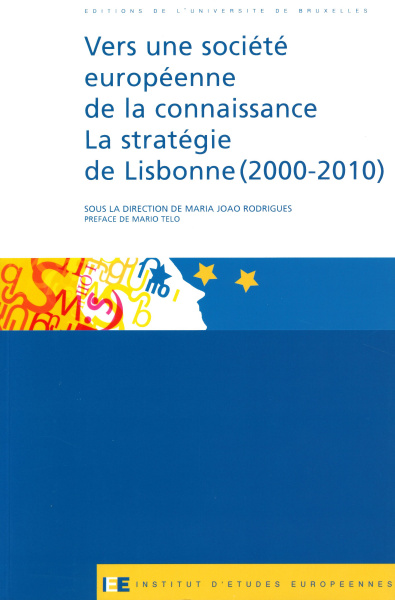Vers une société européenne de la connaissance. La stratégie de Lisbonne (2000-2010)
Première édition
Réunis dans le cadre de la stratégie de Lisbonne, des experts internationaux questionnent l’intégration de la connaissance dans le modèle socio-économique européen. Lire la suite
La connaissance est en passe de devenir une des sources fondamentales du développement économique et social. Mais elle peut devenir aussi une source d'inégalités sociales internes ainsi que de nouvelles hiérarchies de pouvoir international. Est-il possible de concevoir un modèle de société de la connaissance européen, alternatif au modèle américain ? Comment concilier la compétitivité internationale et la révolution technologique avec les valeurs européennes de justice, de cohésion sociale et de démocratie ? Quelle stratégie de modernisation adopter qui inclurait l'innovation technologique, la réforme de l'Etat providence, les politiques européennes pour l'emploi, la recherche, l'éducation le marché unique ?
Ces questions essentielles pour le futur du modèle social européen et de son identité internationale sont abordées dans le présent ouvrage par un groupe interdisciplinaire d'experts internationaux mobilisés par la présidence portugaise de l'Union européenne dans le cadre de la stratégie de Lisbonne, sous la direction de Maria João Rodrigues. La stratégie de Lisbonne pour la modernisation du modèle socio-économique européen est au centre des politiques et du débat stratégique de l'Union pour la décennie 2000-2010.
Spécifications
- Éditeur
- Éditions de l'Université de Bruxelles
- Édité par
- Maria João Rodrigues,
- Préface de
- Mario Telò,
- Introduction de
- Maria João Rodrigues,
- Contributions de
- Luc Soete, Gøsta Esping-Andersen, Robert M. Lindley, Robert Boyer, Lundvall Bengt-Åke, Mark Tomlinson, Manuel Castells, Mario Telò,
- Collection
- Études européennes | n° 30
- ISSN
- 13780352
- Langue
- français
- Catégorie (éditeur)
- > Science politique
- BISAC Subject Heading
- POL058000 POLITICAL SCIENCE / World / European
- Code publique Onix
- 06 Professionnel et académique
- CLIL (Version 2013-2019 )
- 3283 SCIENCES POLITIQUES
- Subject Scheme Identifier Code
- Classification thématique Thema: Sciences politiques et théorie
Livre broché
- Date de publication
- 26 octobre 2015
- ISBN-13
- 978-2-8004-1585-7
- Ampleur
- Nombre de pages de contenu principal : 264
- Code interne
- 1585
- Format
- 160 x 240 x 20 cm
- Poids
- 584 grammes
- ONIX XML
- Version 2.1, Version 3
Google Livres Aperçu
Sommaire
- Introduction | Andrea REA, Saskia BONJOUR and Dirk JACOBS
- Changing migration flows and European identity
The Europeanization of immigration and the re-categorization of the Other
Integration and risk management
The Europeanization of anti-discrimination policies
Denials of recognition and identity mobilization
- CHAPTER I. Categorizing human beings in EU migration law | Kees GROENENDIJK
- Immigrants, labels and laws
Dutch and German terminology for immigrants
Which categories are used in EU migration law
Historical development of the terminology
Conclusion
- CHAPTER II. Mandatory integration provisions in EC and EU Member States law
| Yves PASCOUAU - Integration provisions in EC and national law with regard to family reunification
and long term residents
Towards the extension of mandatory integration provisions
Conclusion
- CHAPTER III. Problematical Otherness: Defining and dealing with the Other in French
and Dutch civic integration abroad policies | Saskia BONJOUR - Introduction
The legal definition of the target group
Naming the problem and the problematic Other
Dealing with Otherness
Conclusion
- CHAPTER IV. Some foreigners more equal than others under EU law | Chloé HUBLET
- Introduction
The personal scope of Article 18 TFEU: an evolution at last?
The ECJ's position in Vatsouras and Koupatantze
The consequences of Vatsouras on the protection of TCNs against discrimination on grounds
of nationality
Conclusion
- CHAPTER V. Borders and security: the different logics of surveillance in Europe
| Didier BIGO, Julien JEANDESBOZ, Francesco RAGAZZI and Philippe BONDITTI - Border and security: decolonising the understanding of border from a security approach
Technology and EU bordering : not stopping people ; enhancer of freedom of circulation
or surveillance mechanism speeding up their travel?
Mobility and its government : speed instead of freedom
Border management practices in the EU
Ethical and political implications of security technologies in Europe
- CHAPTER VI. Reasonable accommodation of religious diversity in Europe and in Belgium:
Law and practice | Emmanuelle BRIBOSIA, Andrea REA, Julie RINGELHEIM and Isabelle RORIVE - Reasonable accommodation in Europe: The legal framework
Reasonable accommodation in Belgium
Conclusion
- CHAPTER VII. The social construction of Otherness | Didier FASSIN
- From borders to boundaries
From reluctance to recognition
From notion to concept
Conclusion
- CHAPTER VIII. Ethnic discrimination and minority identity: A social
psychological perspective | Maykel VERKUYTEN - Group identity lens model
Group identity reaction model
The integration paradox
Conclusion
- CHAPTER IX. Why do minorities rarely report experiences with discrimination?
Exploring qualitatively what inhibits or favours claims of discrimination
| Alejandra ALARCON-HENRIQUEZ and Assaad AZZI - Introduction
Methodology
Results
- CHAPTER X. Communitarian rhetorics within a changing context:
Belgian Pan-African associations in a comparative perspective
| Nicole GREGOIRE and Pierre PETIT - African diasporas and the emergence of African associations in Belgium
Pan-Africanism: A short historical overview
Pan-African associations in Belgium
Towards an interpretive community
- CHAPTER XI. Second generation associations and the Italian social construction
of Otherness | Bruno RICCIO - Introduction
Backlash against diversity
Second generation associations and the challenge of representation
Concluding reflections
- Bibliography
- Abbreviations
- Biographical notes


Compte rendu